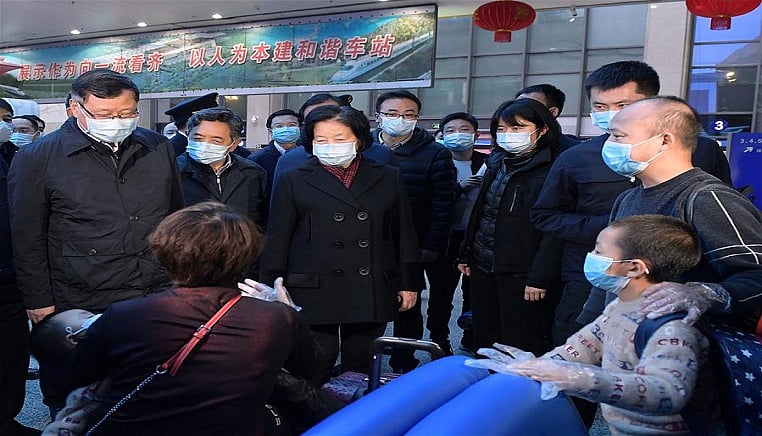China's role in the coronavirus pandemic has come in for intense criticism. Setting aside conspiracy theories of weaponised superbugs cooked up in Wuhan's labs, the limitations of what is known as the “Beijing Consensus” have been exposed. China's soft power and quest for global leadership have suffered a significant setback.
In the wake of the pandemic, Japan has announced a 2.2-billion dollar relocation fund to move its multinationals out of China. US economic advisor Larry Kudlow has proposed a similar fund for American companies. In other words, the pandemic has accelerated the manufacturing exodus triggered by the trade war with the US. Global supply chains are set to transform, at China's cost.
Meanwhile, Taiwan has lashed out at China for blocking its access to the World Health Organisation (WHO) in this time of crisis. In fact, WHO's perceived kowtowing to China has sparked off widespread aspersions – notably by US president Donald Trump - on the UN agency's handling of the pandemic.
In the backdrop of these pronouncements is a growing distrust of the Asian dragon. Political rivalries (like China's incursions into the territorial waters of other countries and its claims over islands in the China Sea) have often taken second place to economic dependencies, but that too, may be set to change.
Champions of the Beijing Consensus, based on China's development model, will have to rethink their position. For developing economies disenchanted with the neoliberalism of the Washington Consensus, 'development à la China' has been touted as a robust alternative.
That the Western market-oriented 'promoting peace through prosperity' model failed in significant ways is beyond doubt, given the multiple currency crises and the collapse of debt-ridden developing economies in the 1990s. In the new millennium, the subprime and European debt crises underlined the vulnerability of developed economies.
By contrast to the rigid adherence to the market formula, China's model has been seen as pragmatic, flexible and innovative: 'infrastructure first, then economic development and finally, social reforms'. Several African countries, resentful of the bureaucratic processes and conditionality-laden aid packages of the IMF and the World Bank, are enamoured of China's “gift diplomacy” and no-strings-attached loans.
China's 'state capitalism' is thus perceived to have delivered the goods without compromising self-determination, financial and otherwise. It offered an alternative to the market-democratic model and in the process, showed that the synergy between laissez-faire capitalism and liberal democracy was not universal.
In this, it was ably assisted by American and European multinationals, who were all too willing to let human rights go by the board while exploiting labour markets in the East, at the cost of jobs back home. For example, Apple has been under fire vis-à-vis harsh working conditions in its factories (subcontracted to Foxconn) in China after a spate of suicides in 2010.
Western democracies and UN agencies have historically been sanguine about China's suppression of democratic impulses, starting with the speedy restoration of diplomatic relations disrupted by Tiananmen Square. The 'liberal' response to the pro-democracy Jasmine protests of 2011 was pallid, with the then US secretary of state Hillary Clinton saying “They are trying to stop history...hold it off as long as possible”.
By 'history', Clinton may well have been referring to Fukuyama's 'end of history' formulation, which sees liberal democracy as the final stage in the evolution of human government. That was nine years ago and China is trundling along happily as an authoritarian, one-party state.
The discourse around the Beijing Consensus glosses over its political illiberalism: suppression of dissent, censorship, forced land requisitions, and so on. Macro indicators are a useful way of sidestepping questions of individual liberty. Economists are able to justify morally untenable policies on the grounds that “they work for China”.
It is precisely these policies, characterised by a lack of transparency and rigid control over information flows that are perceived to have contributed to the current pandemic. Beijing's secrecy about the extent of the coronavirus outbreak has come under scrutiny. Worldwide, public sentiment has turned against China. Simultaneously, its influence in global institutions of governance is being questioned.
China seems confident of riding out the post-pandemic scenario. Low-cost manufacturing based on cheap labour made it the factory of the world and export-led growth made it the world's second largest economy (and one of the top creditors). Now, China is transitioning to higher value-added production and to this end, has tried to create an environment conducive to foreign companies.
On the other hand, a country's soft power depends on its international image and prestige and there's no doubt that China's has taken a serious beating.
The writer is a senior journalist with 35 years of experience in working with major newspapers and magazines. She is now an independent writer and author.

